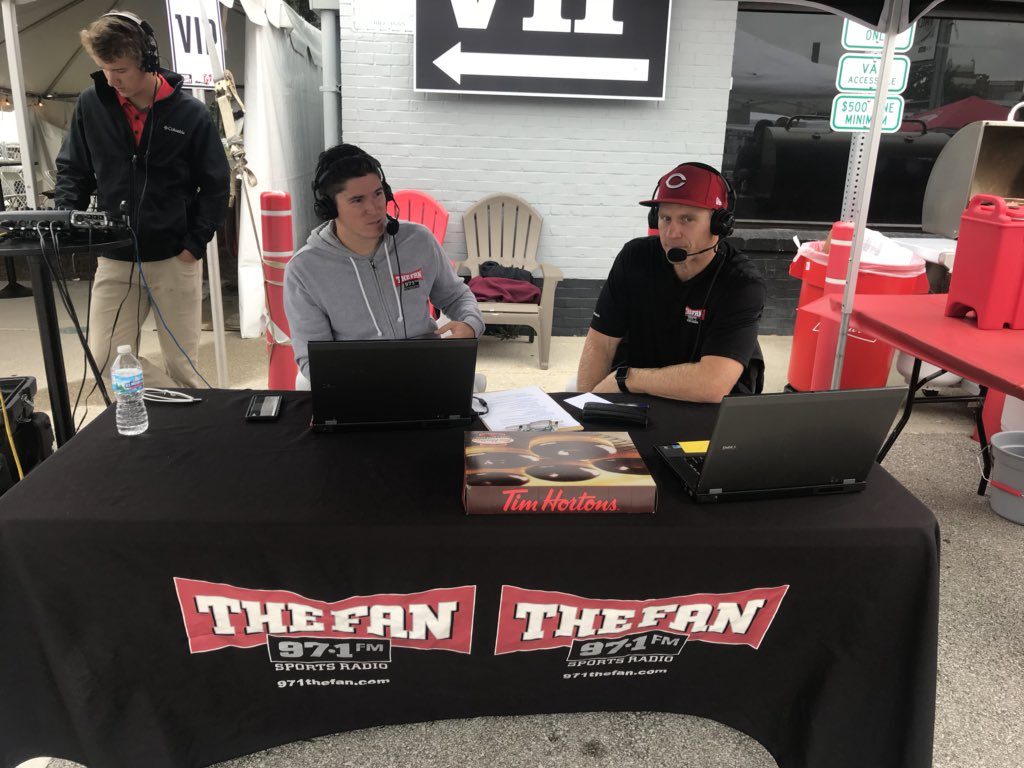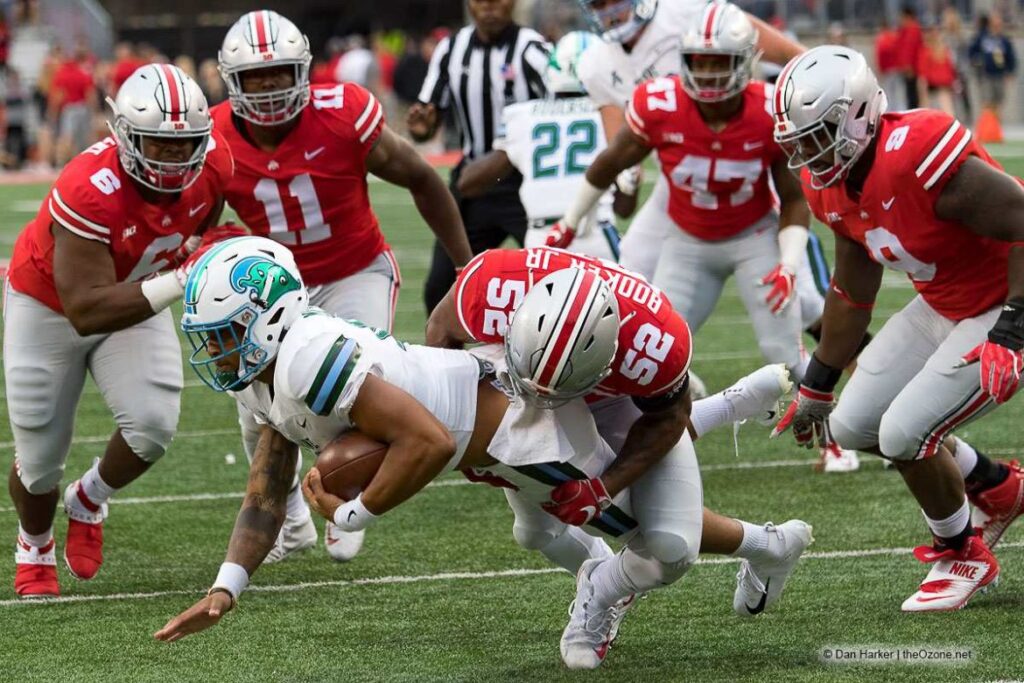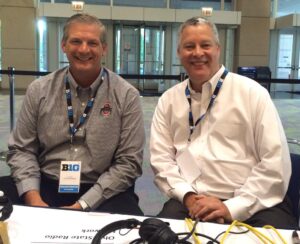On Saturday, Tim Hall will be like many other hosts across the country, as he takes his place behind the mic for pregame coverage of a college football game. The only difference between Hall and everyone else, is that he’ll be covering the Ohio State vs. Penn State game, which is easily the biggest matchup of the weekend. At 97.1 The Fan in Columbus, Ohio, pregame coverage starts 5 and a half hours before kickoff. The show is designed to set the scene of the game and provide a final breakdown that takes listeners to the action just moments before kickoff.
During home games, many stations take the opportunity to host their shows in areas where fans are known to mingle before the game, providing the priceless opportunity to be seen by many potential listeners. The great thing about pregame and postgame shows, is that they’re so different from your weekday programming. During a postgame show, it’s all raw emotion from a huge win or tough loss that the team just suffered. Callers want the head coach fired, the referee punished or the starting quarterback benched after things didn’t work out as according to plan. No matter what your weekday structure is, if real emotion is what you’re looking for, a postgame show is always the best bet to provide it. Hall is a host that’s not afraid to show emotion on the pregame show. In fact, he thinks it sounds best for the listener, considering over 90 percent of people tuning in are diehard Ohio State fans.
With such a big game coming on Saturday, you can bet he’ll try to capture the emotions that Buckeye fans are feeling before kickoff. Along with Hall, is his co-host, Jerry Rudzinski, a former linebacker at Ohio State. The duo make up the first two hours of pregame show on 97.1 The Fan, with a show simply called The Fan Pregame Show.
Easy enough, right?
For two hours of the five and a half hours of pregame coverage, Hall and Rudzinksi will breakdown what the Buckeyes have coming up that day, as well as the bigger matchups in the Big 10 and the rest of the country, before handing it over to the next pregame show on the station.
The Fan has a unique way of hosting its postgame show, as the duties are divvied up between the weekday lineup hosts, instead of just one or two consistent personalities for each game. Due to The Fan carrying the network broadcast for Ohio State football, the station isn’t able to provide its own postgame coverage until an hour or hour and a half after the conclusion of the game. That means if a late kickoff is on the schedule, there’s no postgame coverage that The Fan will provide, seeing it will be late at night before they can even get on the air.
Like everything else in the industry, there’s a right and wrong way to handle pre and postgame coverage. Location is critical, emotion is necessary and caller interaction is warranted. But what’s the most important aspect of putting out a quality product on gameday? Tim Hall helped answer that question and many more in the pursuit of hosting an ideal pre and postgame show.
TM: When you do a two hour pregame show, after doing a regular weekday show, how do you keep it fresh and come up with new information on Saturday?
TH: Good question. I would say that’s not a conscious goal of mine. I don’t go into the two hours thinking that I have to say brand new things or that I have to hold something back during the week to save it for game day. If it’s an important story line, you have to hit it.
If there’s a major injury, like Nick Bosa, just because you talked about it on your show during the week, doesn’t mean you can leave it to the side on a two-hour pregame show. It’s just a different sound, I think it’s totally different. I’m with a different host, so the person I’m with working with is different. Jerry Rudzinksi will always bring me a fresh perspective for something that I haven’t seen or thought about.
We have a couple of different features on our pregame show. We have a whip around segment that I think sounds cool, I’ll get a couple of stringers from Big 10 teams or someone covering a big national game for a 2-3 minute quick-hitter interview that highlights all the big storylines for a particular game.
TM: You just mentioned something interesting that I hadn’t thought about. Do you think it’s best for a pregame show to pair up hosts that don’t do a normal show together during the week?
TH: I do think it works really well. I actually got to do a show with another guy for the TCU game, because my guy Jerry takes one road trip a year to the most fun road game the Buckeyes have. The guy I was able to work with was another former Buckeye football player by the name of Anthony Schlegel. He was a linebacker, he’s got the video on the internet where he tackles a streaker during a game.
He is so energetic, it’s hard to describe. Imagine Nick Swisher doing a football pregame show, that’s what it’s like. He’s like BROhio, deer hunter guy, let’s attack and dominate, ready to go, he stands in the studio and it’s just awesome. Game days are a big money making day for the station and it’s just fun to shake things up a bit and provide a different sound to the listener.
TM: What about phone calls from listeners? Is there any room in a pregame show for that?
TH: I don’t have a strong belief about it, but we haven’t done it. I can’t tell you that there’s a hardcore feeling that I don’t think it sounds good, because, I think for postgame shows, it sounds better.
We’re on the air so far before the game starts, I could envision a caller segment at some point in the pregame show. I don’t know, I would say less of that, I’m not completely opposed to it, but I can’t even remember the last time we did take a call. There’s been times where I’ve had an open segment during a more mundane game day, where it just wasn’t a whole lot going on, much like Tulane last week. So, on game days like that, I could possibly see a segment where you open up the phone lines for people to answer what they hoped to get out of a game such as that.
But I think postgame shows are more for phone calls. That’s way more fun to hear caller reactions with raw emotion to what just happened.
TM: What do you think about a host tweeting their opinions during a game when they have to do a postgame show? Is that bad? Or does each host have the obligation to provide their followers with thoughts during the action?
TH: The guys that do the postgame show for our station don’t go Twitter silent during the game. I certainly haven’t seen anything to where the postgame shows numbers aren’t doing well because of that. I really don’t think that much into it.
I think you do owe it to your followers on social media to tweet as you would any other game that you’re watching, because you still can’t put that much into it, you know? You can put out a main thought, but there’s always more to layer on top of what you’re going to talk about. The fun thing about Twitter is that you can put out a big, bold statement without backing up and leave it there. For example, I could tweet that Dwayne Haskins is the best quarterback in Ohio State history. You can send that out and reference why you said it on the postgame show.
TM: Do you think it’s important for the broadcast to be on location and around the fans on game day?
TH: I love it. I really do. I know when you talk to PD’s and people in management at sports radio stations across the country, there’s mixed opinions on the value of remote broadcasts, but my goodness, we’re here in Columbus where Ohio State football is king. This is the second year where we’re doing our pregame show, the one that I’m a part of, on Lane Avenue just one block north of Ohio Stadium. We’re right in the thick of the foot traffic, where the basketball arena is close by and people are passing by like crazy and stopping by.
We have six or seven tents of sponsors that pay to be a part of the action, there’s a bar about to open up close by, and it’s just really cool. Like I said earlier, it’s just a different feel than during the week. You turn on your radio and you can tell your guys are live and location with a set somewhere, it’s just the old ESPN Gameday mentality, you know? It’s just about setting the scene.
We’re in studio for the road games, but I do think it’s really cool to have the pregame shows out at the stadium. Like, the show that comes on after ours, you get to hear the Ohio State band come marching and playing right up the sidewalk on their way to the sidewalk. You can always hear it and they always pause as they walk by. It’s really cool.
TM: You always have to be fair, especially on a postgame show, but is it good to have a host that can capture the excitement and almost be a fan after a big win or a loss?
TH: I always just go for a lot of emotion. I really don’t think we need to be afraid of being homers, when you’re in the middle of your Ohio State Network coverage. I kind of like it from Buckeye broadcasters, when you hear Jim Lachey yelling over Paul Keels when a long touchdown happens.
Let’s be honest. 95 percent of the people tuning are Buckeye fans and after a big game, everyone is emotional and that’s okay. If something crazy happened and you hate it, or if you’re upset about how the game plan went or even a call from the referee, chances are that people are going to be emotional, and a lot like you, will be listening saying ‘yeah!’ or ‘damn right he should have gotten the ball more!’ Whatever your true and honest thoughts are, go with them and you can amplify it. Local postgame shows, you know who your audience is, I think it’s perfectly okay to show a lot of emotion.
Tyler McComas is a columnist for BSM and a sports radio talk show host in Norman, OK where he hosts afternoon drive for SportsTalk 1400. You can find him on Twitter @Tyler_McComas or you can email him at TylerMcComas08@yahoo.com.








